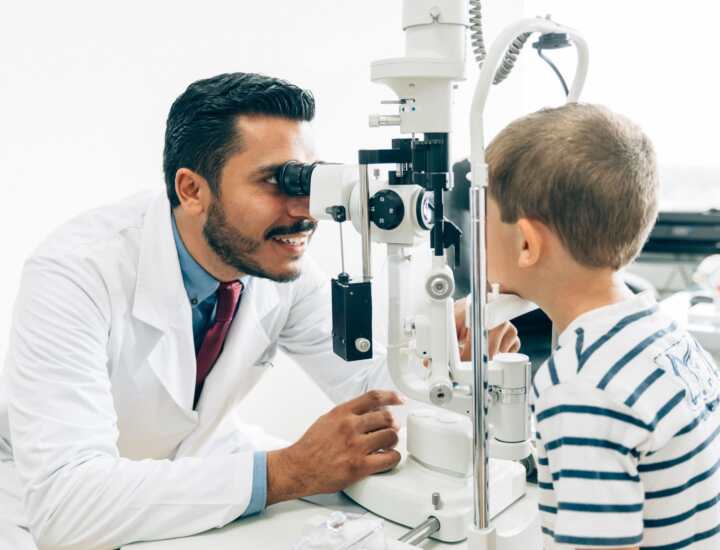Understanding your child's condition
If you’ve just learned that your child is, or will become, visually impaired, this is likely a difficult time for you and your family. You may be unsure how to tell family members and friends about your child’s vision impairment. You may be wondering how your child’s vision impairment is going to impact your child’s future. Diagnosis of a child can be an overwhelming experience.
IRDs are the leading cause of blindness in working age adults and although they are genetic conditions, your child may be the only person in your family with the condition depending on the inheritance pattern. There are over 300 different genes that have been identified to cause IRDs and the symptoms can present very differently in each person.

Vision loss progression will also vary from person to person. For some, the loss of sight is slow and there may be only a small decline over many years. Others may have periods of rapid loss, but with years of no apparent deterioration in between.
An ophthalmologist should provide you with information about their specific condition, however as there are many variables dependent on which gene is causing the IRD, the information they can give you on how your child’s vision loss may progress could be limited. Genetic testing can be a useful way to find out more about their specific condition.

What to tell your child
Telling a child that they have a degenerative eye condition can be challenging. Children tend to be particularly sensitive to people’s emotions. As such, they may sense that something is not quite right or they may believe that they have done something wrong to upset the other members of their family.
In general, it is important to have an open and honest approach, giving them as much information as you are comfortable with and that they can understand at the time. Ensure the level of information you provide is age appropriate.
Certain pieces of information or activities will be more upsetting than others for your child. It can be difficult to predict what they may react to, so it is helpful to be prepared for these times. For example, visits to the doctor, difficulty with an everyday activity, getting lost and a general fear at losing their sight can be emotional triggers for children. Speaking to people who have experienced what your child is going through as well as professionals such as counsellors and psychologist can help you navigate these occurrences.
Telling people about your child's diagnosis
Deciding when and how to tell people is very much a personal decision. For those who have a family history of IRD, they may find it easier to communicate as the condition is familiar. For those who have no family history, it may take longer to come to terms with the diagnosis and how to communicate it to friends and family.
It is worth remembering that in most cases, people cope better when they feel they are not dealing with a problem on their own.
The following ideas may help with when and how to share your child’s diagnoses:
- Think about who should know and tell someone that you trust first.
- Educate people on the condition and how it impacts your child’s day to day activities.
- Those around you can be of more help if they understand the condition and where they may be able to offer support to you and your child.
- If your child’s vision is impacting their schooling or study, consider informing their school so that they can look into possible adjustments to their working environment to support your child.
- If you are unsure of how to have these conversations, you can contact Retina Australia for advice.
You can contact us at: info@retinaaustralia.com.au or 03 9650 5088 or 1800 999 870.

Support for the family
While this will be a difficult time for your child, the impact on parents can also be substantial. It’s important to be attuned to your mental health and where you may need support. Ensuring your good mental health will allow you to best support your child.
For those looking for mental health support, there are some excellent resources from the following organisations:
Beyond Blue: Anxiety, Depression and Suicide Prevention Support
Mind Australia: Community Mental Health Services
Headspace: National Youth Mental Health Foundation
If you feel you would like to talk one-on-one with a qualified professional, you can talk to your GP about a mental health plan and referral to a counsellor for support. You can also reach out to Retina Australia to talk one-on-one or be referred to peer support groups.
Due to the genetic nature of IRDs, your family may want information about whether or not they may be carrying the disease causing gene. Genetic testing can be an effective option for family to confirm their genetic diagnosis and possible impacts.

Support groups
Your child may benefit from connecting with young people living with an IRD to address some of the feelings relating to loss of vision, and to assist in developing an acceptance of their diagnosis.
Contact with other parents of vision impaired children may be beneficial in addressing some of the feelings and concerns relating to their child’s loss of vision and how to adapt. You can also reach out to Retina Australia to be referred to these peer support groups.
Helping to adjust
There is no simple response to a child being diagnosed with an IRD. You want to help your child to come to terms with their diagnosis without becoming over-protective or stripping them of their independence. Vision loss does not necessarily prevent a child from fulfilling their maximum potential, it may just alter the path they need to take.
Supporting your child to be involved in sports or activities and including them in doing things around the home will help build their confidence and allow them the opportunity to learn how to adapt to their condition and their surroundings.
If your child’s vision is impacting their time at school, it can be helpful to speak with the school or education department to discuss the various options available to support your child both in the classroom and as part of any extra-curricular activities and excursions.
Developing skills in the use of low vision aids, technical equipment, mobility and orientation can also assist with confidence and independence.

Adapting the home
Some adjustments may be required to your home so that your child can navigate the space freely and safely. There are many relatively simple things that can be done to help your child move safely through your home using their remaining vision or other senses.
These can include:
- Changes to lighting to ensure rooms are well lit, avoid directional lights and reduce glare
- Ensure a contrast in colours between the floor and furniture to avoid tripping hazards
- Avoid rearranging furniture too frequently as this will disrupt your child’s ability to navigate if the landscape keeps changing.
- Label items clearly so they don’t need to guess what the contents are
- Reduce clutter and keep paths clear to allow easy access to frequently used items.
Many helpful tips can be found from the website of the American Printing House for the Blind: familyconnect.org/info/after-the-diagnosis/adapting-your-home

Finding the right ophthalmologist
It’s important for your child to have regular check-ups with an ophthalmologist so that their progression can be monitored and to also ensure good eye health.
As there will be recurring appointments with your child’s ophthalmologist, it is important that you find one you feel provides adequate information, one you can have an open communication with and who your child feels comfortable with. Open communication between patient, parents and clinician is vital to ensure the best experience for all parties.
Making a choice of ophthalmologist is a personal process but there are some things to keep in mind to help you in the decision-making process.
Genetic testing
Genetic testing can provide an accurate diagnosis of which gene has the variation causing your IRD. The genetic diagnosis gives the patient the following:
- The inheritance pattern of the condition
- Prognosis, or medical progression of the condition
- The possibility of joining a patient registry
- Participating in an appropriate clinical trial
- Risk to other organ systems, in the case of syndromic diseases
- Accessing treatments should they be available (in the future)
- Informs patients about the potential risk of disease to other family members
- A genetic test takes the form of a blood sample from a patient that is analysed in a
- laboratory. The DNA sequence is then screened for known IRD-causing variations.

Although over 300 IRD-associated genes have now been discovered, there is a possibility that your genetic test could come back inconclusive as there may be more genes causing IRDs that have not been discovered yet. However, having your data in a registry means that it can be reviewed each time a new gene is uncovered.
If possible, we recommend you undertake the genetic diagnosis process with a genetic counsellor. Genetic counsellors are health care professionals with specialist expertise in medical genetics and counselling. Their support and guidance through the process can lead to greater understanding for you of your condition and progression of your IRD.
Below is a list of public clinical IRD genetic testing providers in Australia. In some cases, these clinics will be able to access government subsidies to cover costs of genetic testing – please speak to your ophthalmologist regarding your own situation for the best advice on referrals.
- Victoria. Royal Victorian Ear and Eye Hospital – Contact Outpatient Booking Unit – Phone (03) 9929 8500 or via email at Patient.Services@eyeandear.org.au.
- New South Wales. The Sydney Children’s Hospital Network – Phone (02) 9845 3273 ,Email SCHN-CHW-ClinicalGenetics@health.nsw.gov.au
- Queensland. Princess Alexandra Hospital – Ophthalmology clinic – Phone 1300 364 155
- South Australia. Women and Children’s Hospital – Associate Chris Barnett, Clinical Genetics Service Phone (08) 8161 7375 (for women and children). Royal Adelaide Hospital – Dr Nicola Poplawski, Adult Genetics Unit Phone (08) 7074 2697 (for adults)
- Tasmania. Royal Hobart Hospital – Phone (03) 6166 8296
- Western Australia. Lions Eye Institute – Phone (08) 9381 0777, Email – carecentre@lei.org.au
- Northern Territory. Northern Territory Genetics Services (Victorian Clinical Genetics Services providing visiting services to Northern Territory) – Dr Chloe Stutterd, Email: ntgenetics@vcgs@ord.au
- National biobank. Australian Inherited Retinal Disease Registry and DNA Bank (AIRDR) – Phone (08) 6457 2866, Email scghmtp@health.wa.giv.au
If you would like further information about genetic testing, please refer to Retina Australia’s Genetic Testing resource webpage here.
